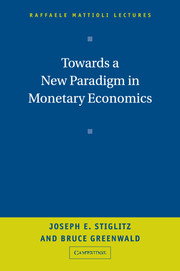Book contents
- Frontmatter
- Contents
- List of figures and table
- The Raffaele Mattioli Lectures
- Preface
- Part I The principles of the new paradigm
- 1 Reflections on the current state of monetary economics
- 2 How finance differs
- 3 The ideal banking system
- 4 Restricted banking (or, the banking system of today)
- 5 Market equilibrium
- 6 From the corn economy to the monetary economy
- 7 Towards a general equilibrium theory of credit
- Part II Applications of the new paradigm
- Bibliography
- Index
5 - Market equilibrium
Published online by Cambridge University Press: 12 May 2010
- Frontmatter
- Contents
- List of figures and table
- The Raffaele Mattioli Lectures
- Preface
- Part I The principles of the new paradigm
- 1 Reflections on the current state of monetary economics
- 2 How finance differs
- 3 The ideal banking system
- 4 Restricted banking (or, the banking system of today)
- 5 Market equilibrium
- 6 From the corn economy to the monetary economy
- 7 Towards a general equilibrium theory of credit
- Part II Applications of the new paradigm
- Bibliography
- Index
Summary
In previous chapters, we have constructed the basic building blocks of our alternative theory of monetary economics, which argues that the focus of monetary policy should shift from the role of money in transactions to the role of monetary policy in affecting the supply of credit. We have shown how imperfect and costly information both leads to imperfections of capital markets and creates an important function for banks – screening among potential borrowers, monitoring borrowing activity, and enforcing debt contracts. We have then shown how the extent to which banks are willing to lend (and the terms at which they are willing to lend) are affected by changes in the external conditions facing banks and by monetary and regulatory policy, and how the impacts of monetary and regulatory policy in turn depend on the nature of competition in the banking sector.
We have developed the basic insights in terms of partial equilibrium models, focusing on the behavior of a representative bank. But assessing the full impact of monetary policy requires embedding the representative bank into a general equilibrium model. This is the topic of this chapter and chapters 6–7. Our focus, however, is on the linkages within the financial system, not the linkages among factors of production and outputs, which is the subject of standard general equilibrium analysis.
In this chapter and chapter 6, we center our attention on the links between deposit rates and lending rates in simple general equilibrium models. In chapter 7, we investigate the links between trade credit and bank credit.
- Type
- Chapter
- Information
- Towards a New Paradigm in Monetary Economics , pp. 104 - 116Publisher: Cambridge University PressPrint publication year: 2003



